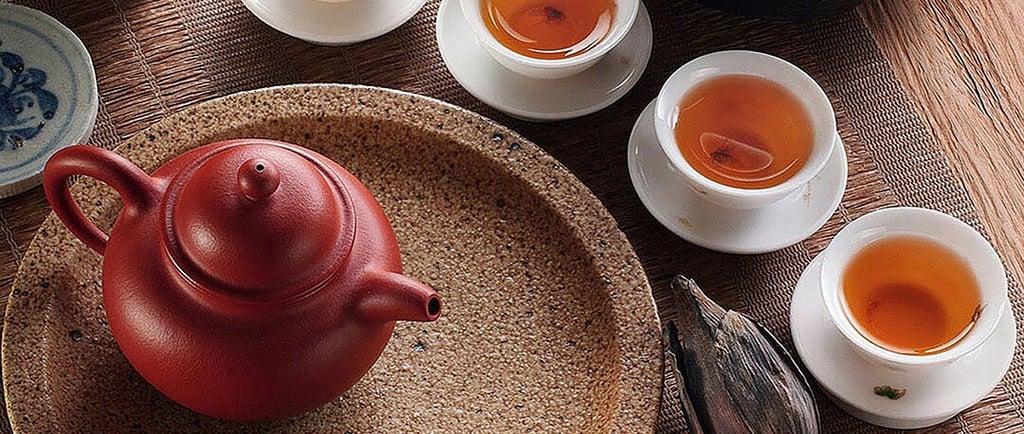Winter Tea Drinking: 4 Hidden Mistakes That Ruin Your Brew
Discover why your favourite tea tastes weaker in winter and how to fix it. Learn the four common mistakes tea drinkers make during cold weather—like using the wrong cup or storing tea in a thermos too long—and simple tips to brew a richer, warmer cup every time.


Winter Tea Drinking: 4 Hidden Mistakes That Ruin Your Brew
TEAPOTARTISAN
Ever Wonder Why Your Tea Doesn’t Taste Right in Winter?
You’re not alone. You brew your favourite tea, but something’s off. The aroma isn’t as rich, the flavour feels weak, and by the time you get to your third steep, it’s just… bland.
Sound familiar?
Winter changes everything when it comes to tea. The temperature, your brewing habits, and even the teaware you use all play a role in how your tea turns out. Miss a few key details, and suddenly, your carefully selected tea tastes nothing like it should.
Let’s fix that. Here are four mistakes most people make when drinking tea in winter—and how to avoid them.
4 Winter Tea Mistakes That Are Ruining Your Brew
1. Using Water That’s Not Hot Enough
🔥 Tea needs heat. Lots of it.
Ever noticed how your tea’s first couple of brews are fragrant and flavorful, but later ones fall flat? That’s because your water isn’t staying hot enough.
In summer, this isn’t a big deal. Even if your kettle sits for 10 minutes, the temperature stays relatively stable. But in winter? Your boiling water cools down faster than you think.
And here’s the issue: different tea aromas activate at different temperatures. High-boiling-point compounds don’t release properly if your water is just warm.
✅ Fix it:
Always reheat your water between brews. Don’t assume your kettle is still hot enough after 10 minutes.
If you’re using an electric kettle, hit the reboil button before each steep.
Consider using a Yixing Zisha teapot (宜兴紫砂壶)—it retains heat better than glass or porcelain.
2. Using the Wrong Cup
Your choice of teacup matters more than you think—especially in winter.
A wide-mouthed cup lets heat escape too quickly, making your tea cool down before you can fully enjoy it.
✅ Fix it:
Use a narrower cup to retain heat and aroma.
Avoid bowl-shaped cups (like a 斗笠杯, or "dǒu lì bēi") in cold weather—they cool your tea too fast.
If you're hosting guests, don’t use oversized cups. Smaller cups keep the tea hot and enhance the drinking experience.
3. Keeping Tea in a Thermos for Too Long
🚫 Never drink tea that’s been sitting in a thermos for hours.
We’ve all done it—brewed tea, poured it into a thermos, and sipped on it throughout the day. Seems convenient, right?
Wrong. Tea left in a thermos loses its flavour and can develop a stale, over-extracted taste.
Even worse, the heat traps in unwanted compounds, making your tea taste dull and lifeless.
✅ Fix it:
Drink freshly brewed tea. If you need to keep it warm, finish it within 3–5 hours.
Instead of brewing too much at once, make smaller, more frequent batches.
If you love hot tea on the go, use an insulated ceramic flask rather than a metal one.
4. Adding Too Many Extras When Brewing
In winter, it's tempting to throw in ginger, red dates, goji berries, or even licorice when brewing tea.
🚨 Bad idea.
Adding extras doesn’t always create a "super tea"—sometimes, it just masks poor-quality tea or overpowers delicate flavours.
Think of it like fresh seafood. A high-quality fish is best enjoyed with minimal seasoning—just a pinch of salt to bring out its natural taste.
Tea is the same. A great tea stands on its own.
✅ Fix it:
Want herbal benefits? Drink herbal tea separately.
If you must mix, use subtle additions—like a single slice of dried tangerine peel, not a handful of ingredients.
Stick to pure tea first, then experiment one ingredient at a time.
Final Thoughts
Winter tea drinking is all about small but powerful tweaks. Keep your water hot, choose the right cup, avoid stale thermos tea, and don’t overcomplicate your brew.
Simple fixes = better tea, every time.
Now go and make yourself a perfect winter brew. Cheers! 🍵
FAQs
1. What’s the best way to keep tea warm in winter?
Use a narrow-mouthed cup, reheat water frequently, and consider using a Yixing Zisha teapot, which retains heat well.
2. Can I store tea in a thermos overnight?
No. Tea stored too long in a thermos develops an over-extracted, stale taste. Drink it within 3–5 hours for the best flavour.
3. What’s the best tea to drink in winter?
Aged white tea, roasted oolong, or ripe pu-erh—they have deeper, warming flavours perfect for colder months.
4. Should I add ginger or dates to my tea in winter?
Not always. Great tea stands on its own. If you want the benefits of herbs, try drinking them separately instead of mixing them with tea.
5. Why does my tea taste weaker in winter?
It’s usually because your water isn’t hot enough or your tea is cooling too fast. Fix these, and your tea will taste way better.
